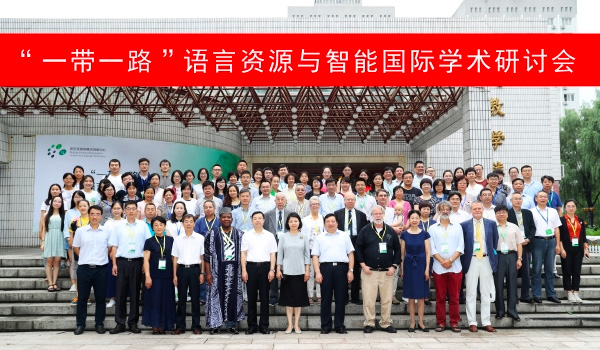On July 15th, 2017, the International Symposium on Belt and Road Language Resources was held in BLCU. With the theme of “Language Resources and Intelligence”, the symposium aims to bring in researchers and scholars anddraw more attention to this field. More than 200 experts and scholars from 10 countries and regions including the United States, Italy, Denmark, Lithuania, Greece, the Netherlands, Singapore, Hong Kong, and Macao attended the Symposium. They discussed the latest achievements and prospected the developing trends on “Language Resource Protection and Development”, “Language Intelligence and the Future Society”, “Language Connectivity” and other areas through 6 keynote reports, 14 invited reports and 2 panel discussions.

In the first day’s keynote speechs ession, Prof. Li Yuming, Director of ACLR made a speech entitled “Embracing the Age Where Human and Machine Co-exist”. Prof. Mark Liberman, Director of LDC of University of Pennsylvania, and Prof. Alessandro Treves, Director of Neuroscience Department of Scuola Internazionale Superiore di Studi Advanzati (SISSA), Foreign Academician of the Norwegian Academy of Science and Letters respectively made keynote reports of “Speech, Language, and Communication Across the World: Resources, Technology, and Science” and “Language Universality and Language Diversity along Vowel Belts and Roads”, expounding the views on language resources, language intelligence and language education from macro and micro perspectives.
In the invited speeches part, 11 top experts from home and abroad fully communicated with the participants on topics including machine translation, language resource construction, language computing, and language connectivity.
In addition, Prof. Sun Hongkai, Member of the Chinese Academy of Social Sciences and Prof. Sun Maosong, Director of Research Center for Massive Online Education, Tsinghua University, moderated two panel sessions “Theory and Method for Counting World Languages” and “Natural Language Processing: Today’s Basic Situation and Challenges”, which enabled Chinese and foreign guests to have a more in-depth dialogue on relevant topics.
The symposium was held after the successful conclusion of the Belt and Road Forum for International Cooperation, aiming at discussing two major matters that human language life is currently facing: first, human languages are extensively endangered and quite a few of them are dying out; second, with the rapid development of artificial intelligence, robots with language intelligence are more involved in human production and life. Questions such as how to protect human language resources and how to meet the era where human beings and robots coexist were highlighted at the symposium. This symposium brought together leadingscholars from home and abroad in related fields to exchange and share frontier academic perspectives and latest achievements, a rousing resonance from the Chinese and foreign academic circles on the new situation of the language resources and intelligence field. It is of great significance in promoting the culture and language exchanges between China and countries and regions along the Belt and Road and building a community with a shared future for mankind.